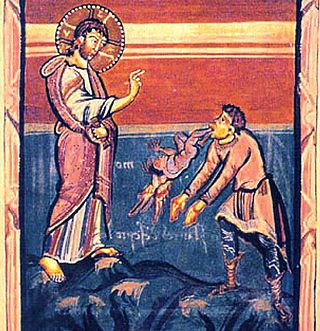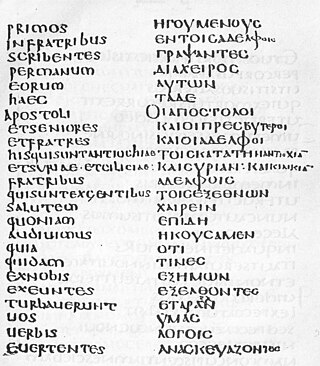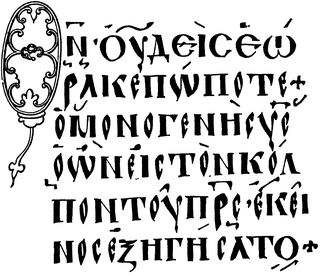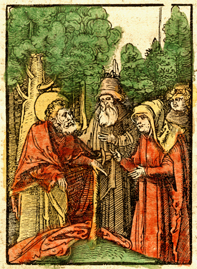
The first-century Jewish historian Flavius Josephus provides external information on some people and events found in the New Testament. The extant manuscripts of Josephus' book Antiquities of the Jews, written around AD 93–94, contain two references to Jesus of Nazareth and one reference to John the Baptist.

Flavius Josephus or Yosef ben Mattityahu was a Roman–Jewish historian and military leader. Best known for writing The Jewish War, he was born in Jerusalem—then part of the Roman province of Judea—to a father of priestly descent and a mother who claimed royal ancestry.
The Sadducees were a sect of Jews active in Judea during the Second Temple period, from the second century BCE to the destruction of the Second Temple in 70 CE. The Sadducees are described in contemporary literary sources in contrast to the two other major sects at the time, the Pharisees and the Essenes.

Herodias was a princess of the Herodian dynasty of Judaea during the time of the Roman Empire. Christian writings connect her with the execution of John the Baptist.

Herod Antipas was a 1st-century ruler of Galilee and Perea. He bore the title of tetrarch and is referred to as both "Herod the Tetrarch" and "King Herod" in the New Testament. He was a son of Herod the Great and a grandson of Antipater the Idumaean. He is widely known today for accounts in the New Testament of his role in events that led to the executions of John the Baptist and Jesus of Nazareth. His father, Herod the Great, was described in the account as ordering the Massacre of the Innocents, marking the earliest Biblical account of the concerns of the government in Jerusalem regarding Jesus's existence.

Most scholars who study the historical Jesus and early Christianity believe that the canonical gospels and the life of Jesus must be viewed within their historical and cultural context, rather than purely in terms of Christian orthodoxy. They look at Second Temple Judaism, the tensions, trends, and changes in the region under the influence of Hellenism and the Roman occupation, and the Jewish factions of the time, seeing Jesus as a Jew in this environment; and the written New Testament as arising from a period of oral gospel traditions after his death.

Herod Archelaus was the ethnarch of Samaria, Judea, and Idumea, including the cities Caesarea and Jaffa, for nine years. He was the son of Herod the Great and Malthace the Samaritan, brother of Herod Antipas, and half-brother of Herod II. Archelaus came to power after the death of his father Herod the Great in 4 BC, and ruled over one-half of the territorial dominion of his father. Archelaus was removed by the Roman emperor Augustus when Judaea province was formed under direct Roman rule, at the time of the Census of Quirinius.

Matthew 2:3 is the third verse of the second chapter of the Gospel of Matthew in the New Testament. In the previous verse the magi had informed King Herod that they had seen portents showing the birth of the King of the Jews. In this verse he reacts to this news.

Matthew 3:1 is the first verse of the third chapter of the Gospel of Matthew in the New Testament. This verse takes up the narrative some thirty years after Matthew 2:23, beginning the account of Jesus' ministry. This verse introduces the figure of John the Baptist.

Matthew 4:17 is the seventeenth verse of the fourth chapter of the Gospel of Matthew in the New Testament of the Christian Bible. In the previous verses Jesus returned to Galilee after hearing of the arrest of John the Baptist and then left Nazareth for Capernaum. This verse reports that once in Capernaum, Jesus began to preach.

The baptism of Jesus, the ritual purification of Jesus with water by John the Baptist, was a major event described in the three synoptic Gospels of the New Testament. It is considered to have taken place at Al-Maghtas, today located in Jordan.

Matthew 4:23 is the twenty-third verse of the fourth chapter of the Gospel of Matthew in the New Testament. Jesus has just recruited the first four disciples, this verse begins a brief summary of and introduction to Jesus' ministry in Galilee that will be recounted in the next several chapters.

Matthew 4:24 is the twenty-fourth verse of the fourth chapter of the Gospel of Matthew in the New Testament. This verse is part of a brief summary of and introduction to Jesus' ministry in Galilee, which will be recounted in the next several chapters. This verse relates Jesus' fame "throughout all Syria" and summarizes his work of healing.

Matthew 4:25 is the twenty-fifth, and final, verse of the fourth chapter of the Gospel of Matthew in the New Testament. This verse is part of a brief summary of and introduction to Jesus' ministry in Galilee, which will be recounted in the next several chapters. This verse lists the many locations from which people came to see Jesus.

John 4 is the fourth chapter of the Gospel of John in the New Testament of the Christian Bible. The major part of this chapter recalls Jesus' conversation with the Samaritan woman at the well in Sychar. In verses 43-54, he returns to Galilee, where he heals a royal official's son.
Ananus ben Ananus was a Herodian-era High Priest of Israel in Jerusalem, Judea Province. He was the High Priest who ordered the execution by stoning of James, the brother of Jesus, according to the Antiquities of the Jews of Josephus. A delegation sent by citizens upset over the perceived breach of justice met Lucceius Albinus before he reached Judea, and Albinus responded with a letter informing Ananus that it was illegal to convene the Sanhedrin without Albinus' permission and threatening to punish the priest. Ananus was therefore deposed by King Herod Agrippa II before Albinus's arrival and replaced with Jesus ben Damneus.

Acts 21 is the twenty-first chapter of the Acts of the Apostles in the New Testament of the Christian Bible. It records the end of Paul's third missionary journey and his arrival and reception in Jerusalem. The narrator and his companions ("we") play an active part in the developments in this chapter. The book containing this chapter is anonymous, but early Christian tradition uniformly affirmed that Luke composed this book as well as the Gospel of Luke.

Acts 23 is the twenty-third chapter of the Acts of the Apostles in the New Testament of the Christian Bible. It records the period of Paul's imprisonment in Jerusalem and then in Caesarea. The book containing this chapter is anonymous, but early Christian tradition uniformly affirmed that Luke composed this book as well as the Gospel of Luke.

Acts 25 is the twenty-fifth chapter of the Acts of the Apostles in the New Testament of the Christian Bible. It records the period of Paul's imprisonment in Caesarea. The book containing this chapter is anonymous, but early Christian tradition uniformly affirmed that Luke composed this book as well as the Gospel of Luke.

John 1:19 is the nineteenth verse in the first chapter of the Gospel of John in the New Testament of the Christian Bible.

















